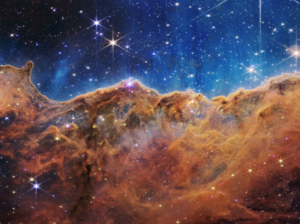Sacred Space by Peggy Hansen

Sacred Space —
What do these words mean to you?
How do you define sacred space and, then, how do you relate to your ideas about it? These questions feel very wide and deep to me. Complex, daunting, intriguing, and, yes, spacious. I’m curious about the ways in which our various cultures, our faith backgrounds, and our individual experiences influence what we believe about what is—and what is not—sacred.
I’m often struck by the resonance among the disparate things I read and hear when I’m exploring something interesting and important. New information that is coming from a different perspective echoes something I’ve heard before. In different language, a different setting, perhaps, but a kind of intersection of similar messages.
For example, right now—as I puzzle over how to live in this world of 2022—I’m standing in the intersection of a succession of voices… Brooks, Oliver, Niebuhr, Stockdale, and Kimmerer. In a recent PBS Newshour, David Brooks spoke of this time as “an atmosphere of menace.” That helped explain the heaviness, the dread, that I feel in response to the multiple threats human beings are being faced with. Much of what I think of as sacred is suffering great harm.
And then, Mary Oliver’s voice could well be mine, in her poem, “I Go Down to the Shore”.
I go down to the shore in the morning
and depending on the hour the waves
are rolling in or moving out,
and I say, oh, I am miserable,
what shall–
what should I do? And the sea says
in its lovely voice:
Excuse me, I have work to do.
The sea, in its sacred space, tells me it has its own work to do, and I imagine it’s suggesting
that I find the work that is meant for me to do.
That gentle admonition—speaking of resonance—reminds me of the original version of
Reinhold Niebuhr’s Serenity Prayer:
God, give me the serenity
to accept things
which cannot be changed;
Give me the courage
to change things
which must be changed;
And the wisdom
to distinguish
one from the other.
These words feel more muscular, more active, than those of the version we’ve become familiar with. It speaks of things “that must be changed” and the need to “distinguish”—to intentionally discern—when to step back and when to step forward.
So much in this troubled, sacred world needs to be changed. I feel like apologizing to
God for the mess we’ve made of this beautiful creation. Did God have any idea of the havoc
that bestowing free will on human beings would cause? How self-indulgent choices would
lead to resounding harm?
When we contemplate the enormity of today’s problems, we feel very small in comparison. What do we have to offer? How could we possibly make a difference? Too often, our imagined answers lead us away from engaging with the reality of the complex distress.
That takes me in the direction of the Stockdale Paradox, referenced in Jim Collins’ book,
Good to Great. “Productive change begins when you confront the brutal facts…. You must
maintain unwavering faith that you can and will prevail in the end, regardless of the difficulties, and at the same time, have the discipline to confront the most brutal facts of your current reality, whatever they might be.” This echoes Niebuhr’s praying for “courage”—that
beautiful, brave, determined persistence that is stronger than the fear of failure.
Finally, I appreciate the scientific and Indigenous wisdom of Robin Wall Kimmerer. In
her remarkable book, Braiding Sweetgrass, she notes ,“Many Native peoples across the
world, despite myriad cultural differences, have this in common—we are rooted in cultures of
gratitude.” What would it feel like if we were to begin each day with a specific and vocal
statement of gratitude? Would that quiet our apprehension about the very real distress around and within us, and help us move toward understanding what we might do with this single, particular hour?
What if we were to stay with the hard questions, less attached to the outcome. If we continued to ask: “Today, what can I do that would help to ease the suffering of someone?” “What can
I do that will reflect my appreciation of being one small part of this very large and sacred
world?”
